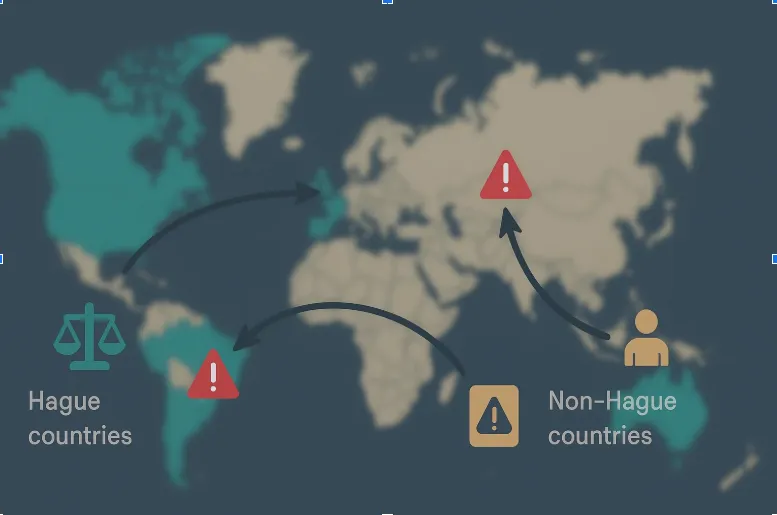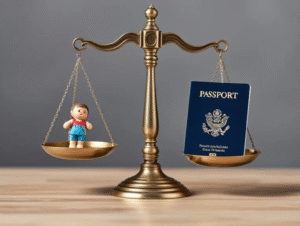When seeking permission to relocate a child after divorce UK, careful planning and strong legal foundations are essential. Courts in the UK require not just a compelling reason for the move but also clear evidence that it supports the child’s welfare. This article explains what documentation is needed, the consequences of unlawful relocation, and how international enforcement works.
Table of Contents
Preparing a Strong Relocation Application
UK courts expect a well-structured, child-focused relocation plan when you apply to move a child abroad. You will need to demonstrate that the move is in the child’s best interests, not just convenient for you. That means providing detailed plans about where you intend to live, what school the child will attend, how you will cover finances and healthcare, and how the child’s day-to-day life will be secured in the new country. Key evidence should include a relocation statement explaining your reasons for the move and the benefits for the child, proof of employment or income (such as job offers in the destination country), confirmation of housing arrangements, and information about schools and medical facilities available to the child. It is also important to outline a contact plan for the left-behind parent – for example, proposing regular video calls and visits during school holidays – to show the court that the child will still maintain a meaningful relationship with both parents.
In preparing your case, remember that the child’s welfare is paramount under the Children Act 1989. Judges will consider factors like the child’s needs, educational opportunities, stability, and ties to each parent. If cultural or religious upbringing is a motivating factor for the relocation, it can be included as part of your argument – for instance, moving closer to extended family or to a country where the child can learn their heritage language or religion. However, cultural reasons alone will not justify relocation unless they tangibly benefit the child’s well-being. Every assertion you make should circle back to how it advantages the child. For example, if you plan to move to a country where your family can help with childcare and offer a supportive extended family environment, emphasize how that support network will improve the child’s life.
Obtaining consent or a court order
Legally, you must seek consent of the other parent in writing or permission from a UK court (often via a child arrangements order or specific issue order) before relocating abroad or avoiding parental child abduction. If the other parent agrees, it is wise to get their consent formally documented. If they do not consent, you will need to apply to the Family court for permission to relocate (sometimes called an application for “leave to remove” a child from the jurisdiction). As part of this application, all the evidence and plans mentioned above will be critical.
The court will scrutinise your proposal to ensure it is robust and genuine. It may also seek the child’s wishes and feelings if the child is old enough to express them and understand the situation. Given the high stakes, it is strongly advised to consult experienced UK child custody lawyers early in the process. If you are to seek specialist legal advice, our lawyers at AAGA Solicitors can help you prepare a persuasive application meeting the legal requirements and ensure you address any concerns the court (or the other parent) might raise be it about the financial impact, regular contact of the child other parent, bonding with the parent’s new partner, necessary travel arrangements and making sure of making the child comfortable while relocating abroad. Sound legal advice and thorough preparation greatly increase the chances of the court approving an international relocation
The Risks of Unauthorised Relocation
Attempting to relocate a child abroad without the proper consent or court order is extremely risky and in fact illegal. Removing a child from the UK without permission from the other parent (or the court) is considered a criminal offence under the Child Abduction Act 1984, which is the cornerstone of child abduction laws in the UK. In plain terms, such an act is treated as international child abduction. The moment a child is taken across borders unlawfully, the left-behind parent can immediately ask a UK court for emergency orders to secure the child’s return. UK authorities and courts take these situations very seriously.
If a parent tries to go ahead with an unauthorised relocation without a valid court order, they face severe consequences. Firstly, the court will almost certainly order the child’s return to the UK as soon as possible. Through the framework of the Hague Convention on the Civil Aspects of International Child Abduction, which the UK is part of, law enforcement agencies across member countries cooperate to locate and return abducted children to their country of habitual residence. Many countries worldwide (including European nations, the USA, and others) are signatories to this treaty. This means that if a child is taken to another Hague Convention country, the left-behind parent can initiate a Hague application, and authorities in that country are obliged to help return the child swiftly to the UK so that custody issues can be handled by the UK courts. Police, border agencies, and even Interpol may become involved in tracking down the child’s whereabouts.
The relocating parent who attempted the illegal move can be arrested in the UK (and potentially in the foreign country as well, if that country cooperates) and could face criminal charges. In addition, that parent’s actions will heavily damage their case in any future custody or contact proceedings – a judge is likely to view an attempted abduction as evidence of poor judgment and a disregard for the child’s welfare. In practical terms, an unlawful relocation attempt can result in the parent losing existing custody or access rights. It also inflicts emotional trauma on the child, who may be suddenly uprooted and then sent back amid a legal dispute.
In short, the risks of an unauthorised relocation are not worth it. If one parent is worried that the other parent might try to take the child without permission, they should seek legal advice immediately. Courts can issue preventive measures (like a prohibited steps order to block the child’s removal from the country, and alerts at airports) to protect against abduction. It is far better to use the lawful channels – or stop an illegal move in its tracks – than to suffer the grave consequences of breaching UK and international law.
Relocating to a Non-Hague Country

Secure Your Rights with Trusted Legal Guidance
International relocation cases demand more than just good intentions – they require legal precision, cultural awareness, and comprehensive planning. Working with knowledgeable family law professionals is essential. At AAGA Solicitors, we have a team of dedicated family law solicitors with extensive experience in UK divorce and child custody matters, including complex international relocation and abduction cases. We pride ourselves on being solicitors for international families: our firm has a deep understanding of the challenges faced by multicultural and transnational households. In particular, we offer culturally sensitive legal services for Asian families in the UK, as well as for clients from other global backgrounds. We understand the nuances that heritage, religion, and extended family considerations can bring to a relocation case, and we ensure those factors are respectfully presented within the framework of UK law.
Whether you are seeking permission to move abroad with your child or you need to object to a proposed relocation, our lawyers will guide you every step of the way. We help gather compelling evidence, navigate the court process, and, most importantly, keep the focus on protecting your child’s well being. Our approach is both empathetic and strategic – we know how emotionally charged these cases can be, and we also know how to present a strong legal argument to the court. Moreover, our team is well-versed in international conventions like the Hague Convention and has contacts with legal experts in various countries, which can be invaluable if your case spans multiple legal systems.
By choosing experienced family law solicitors who regularly work with the UK’s Asian communities and international custody disputes, you give yourself the best chance of achieving a positive outcome. Relocating parents after a divorce face difficult decisions; with trusted legal guidance, you can pursue it with confidence or challenge it with conviction, ensuring your rights and your child’s welfare are protected at every stage.
In case, you want more information for a smooth divorce process that is related to the process of child relocation or the child arrangements order, we are here for you.









